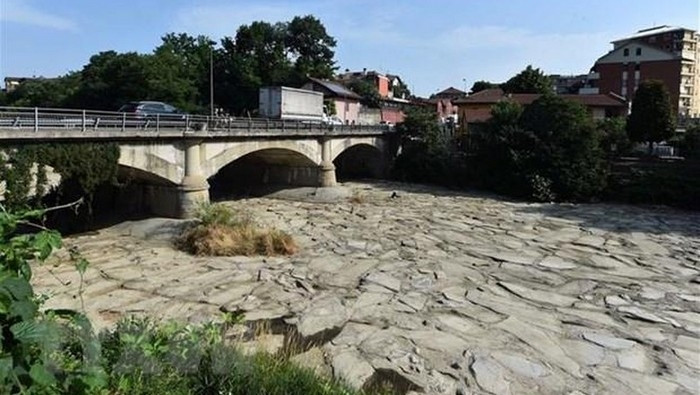The images of dry and cracked fields, rivers and lakes, due to a sharp drop in the water levels, have been found regularly in rural areas of Europe on hot summer days. Farmers are increasingly pessimistic as the longest and hottest drought in centuries is spreading across the continent.
According to scientists, the 2022 drought could be the most severe in the "old continent" within 500 years. The drought put farmers at risk of crop failure and caused a series of consequences such as disrupting coal transport in Germany, strongly affecting the operation of nuclear power facilities in France and causing forest fires in English and Spain.
The European Union's Global Drought Observatory (GDO) estimated that 17% of Europe was now in its red-alert category, higher than the 11% given in July. Although normal rainfall will be recorded in parts of Europe in the coming months, it will not be enough to fully recover the water lost during the first half of the year.
In Italy, extreme weather is likely to reduce at least a third of the country's total agricultural output. The owner of an olive and grape farm, in the Tuscany region in central Italy, predicted that this year's grape production will decrease by 20%, while the olives will be smaller and have a more bitter taste. Other parts of Europe shared the same fear of damage in the agricultural sector.
The Ministry of Agriculture of Hungary, said the country's agricultural losses from the beginning of 2022 until now, are more than twice the total loss of the previous decade. To adapt to extreme weather, some farmers in the central European country turned to developing tropical crops like bananas and kiwis. In Slovenia, farms without irrigation systems can lose their crops completely this year.
Hot weather and drought have pushed not only the agricultural industry but also other sectors such as energy and transportation into difficulties. High temperatures caused damage to infrastructure, cracked road surfaces and deformed railway tracks, disrupting traffic in some countries including the UK, the Netherlands, and Italy. Water shortages also hurt the energy sector, because water is important for hydroelectricity production. This situation threatens to increase Europe's electricity prices, which are already at record highs.
A series of measures, including restrictions on water consumption, has been applied in countries to deal with severe water shortages. However, these are only temporary measures.
Experts warned that the problems the agricultural industry has been facing will happen more regularly in the future. This requires the world to act quickly and more drastically when disasters from climate change are “knocking” on every continent, including Europe, which has long been famous for its cool climate.
















